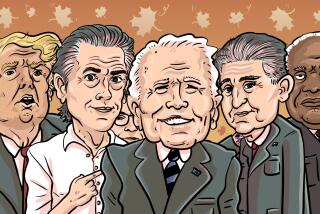Maturity Came Quickly in War : Ehlers Led His Men Through German Machine-Gun Fire
Walter Ehlers was hardly more than a youngster when he enlisted in the Army in 1940.
Four years later he was a battlefield veteran who had shown such courage during World War II in the days following the Normandy invasion that he was awarded the Medal of Honor.
His citation for bravery reads: “Staff Sgt. Ehlers repeatedly led his men against heavily defended enemy strong points, exposing himself to deadly hostile fire whenever the situation required leadership. Ehlers knocked out numerous strong points, including a machine gun nest, then carried a wounded members of his squad to safety, even though he had been wounded.”
Ehlers, 66, lives with his wife, Dorothy, in Buena Park. They have two daughters and a son.
At 10 a.m. on June 9, 1944, Ehlers and his 12-man squad moved across an open field in France. It was overcast and cool. Three days earlier, Ehlers and his men had waded ashore at Omaha Beach on the Normandy coast. Ehlers’ orders were to move into France as fast as possible for reconnaissance of German defenses.
Rifle and machine gun shots rang out. Ehlers and his men crouched low and made a dash for a hedgerow, a line of young trees that separated fields and marked property lines.
“When I got to the hedgerow--I was the first one there--I encountered a German patrol,” he says.
Ehlers, who already had the invasions in North Africa and Sicily under his belt, “knocked out” the patrol, killing the four enemy.
“I had my men fix their bayonets,” Ehlers recalls, adding that the knives attached to the end of the rifles come in handy because “eight rounds is not always enough.”
A bayonet can have “a terrific impact” on the enemy when you charge their position, he says. “I was ahead of my squad when I came upon a machine gun nest and knocked it out.” Three more Germans were dead. Ehlers went farther, still out in front of his squad. “I came upon a mortar section with five or six people. That’s where my bayonet came in handy. They looked horrified and started running.”
Then Ehlers single-handedly knocked out another machine gun nest, killing and driving off Germans.
The next day, “we were caught in an untenable position,” Ehlers says. “We were so far ahead (of the rest of the Allied Forces) we were practically nose to nose with the Germans.”
The soldiers were almost surrounded and came under fire from both flanks, the front and the right rear. Ehlers said his squad was ordered to withdraw to the next hedgerow.
Withdrawing from an enemy so close was not any easy task.
Ehlers and another squad member stood almost back to back on a mound of dirt in the field and fired in semicircles, covering the retreat of the rest of the men. “We fired as rapidly as we could.”
Spotting a machine gun in a nearby hedgerow, Ehlers knocked it out. As Ehlers and the other squad member turned to withdraw, a bullet hit Ehlers in the back, swinging him almost completely around. He saw the sniper as he was falling down and fired, hitting the German. Despite the wound, Ehlers picked up another wounded soldier and carried him to a safety.
“I probably knew more about what I was doing than most of the other guys under me,” Ehlers reflects. “I knew what I had to do to survive or try to survive or protect my people from getting killed.
“I had a lot of training before I went into combat, and I think that helped me become a leader. Had I not had all that training, I would have been as confused as some of the people around me.”
Ehlers still remembers the sickening feeling in his stomach each time he went into combat. Until the first shot was fired he always felt as if he were going to throw up.
“When the first shot is fired and then you know what is going to happen, you head for cover, you react, and then you don’t have time to worry about what is happening to your stomach then.”
More to Read
Sign up for Essential California
The most important California stories and recommendations in your inbox every morning.
You may occasionally receive promotional content from the Los Angeles Times.










